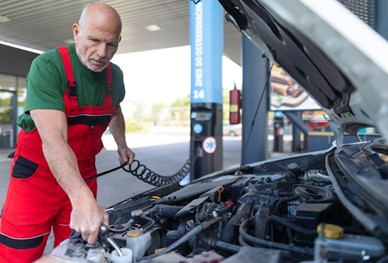Running a gas station involves more than just selling fuel. It requires meticulous planning, efficient operations management, adherence to safety regulations, and excellent customer service. Whether you’re a new gas station owner or just looking to optimize your current operations, Nick Kambitsis of Raceway Petroleum provides a comprehensive guide that covers key aspects to ensuring success in this competitive industry.
Efficient Inventory Management
Effective inventory management is critical for maintaining smooth operations and maximizing profitability in a gas station business. By implementing strategic approaches and leveraging technology, gas station owners can optimize stock levels, reduce costs, and enhance customer satisfaction.
Automated Systems
One of the most effective ways to manage inventory is through the use of automated systems. These systems can significantly streamline the process of tracking and ordering inventory, thus reducing manual errors and saving time.
- Fuel Levels: Automated inventory systems can monitor fuel levels in real-time, providing alerts when fuel needs to be reordered. This ensures that the gas station never runs out of fuel, which could lead to lost sales and dissatisfied customers. Modern systems can even predict usage patterns and suggest optimal times for refueling based on historical data.
- Convenience Store Items: Similarly, automated systems can track the stock of convenience store items, from snacks and beverages to automotive supplies. By monitoring sales data, these systems can determine the best times to reorder and even suggest quantities based on sales trends.
- Automate Ordering Processes: Automation can also streamline the ordering process itself. When inventory levels drop below a certain threshold, the system can automatically generate purchase orders and send them to suppliers. This not only saves time but also ensures that orders are placed promptly, reducing the risk of stockouts.
Inventory Turnover
Regularly assessing inventory turnover rates is essential in order to avoid overstocking or shortages. Inventory turnover is a measure of how quickly inventory is sold and replaced over a given period.
By analyzing turnover rates, gas station owners can identify which products sell quickly and which do not. This information is crucial for making informed purchasing decisions. For instance, items with high turnover rates should be reordered frequently to avoid stockouts, while items with low turnover rates might require a reduction in order quantities or even elimination from the product line.
Inventory needs can fluctuate significantly with the seasons. For example, windshield washer fluid and antifreeze may sell more during the winter, while cold beverages and ice cream are in higher demand during the summer. By adjusting purchasing quantities based on these seasonal demand fluctuations, gas station owners can ensure they always have the right products on hand without overstocking.
Supplier Relationships
Building strong relationships with reliable suppliers is another key component of effective inventory management. Reliable suppliers help ensure the consistent availability of fuel and products, which is crucial for maintaining smooth operations and meeting customer expectations.
- Negotiating Favorable Terms: Developing strong supplier relationships can lead to better terms, such as increased discounts for bulk purchases or more favorable payment terms. These benefits can directly impact the gas station’s profitability by reducing costs and improving cash flow.
- Ensuring Timely Deliveries: Reliable suppliers are more likely to deliver products on time, which is crucial for maintaining inventory levels and preventing stockouts. In cases of emergency or unexpected demand spikes, having a strong relationship with suppliers can also mean quicker response times and priority treatment.
- Diversifying Suppliers: While building strong relationships with key suppliers is important, it’s also wise to diversify the supplier base. Relying on a single supplier can be risky if that supplier faces disruptions. By having multiple suppliers for critical products, gas station owners can mitigate risks and ensure a more stable supply chain.
Staff Training and Development
Well-trained staff are essential for providing excellent customer service and maintaining operational efficiency:
- Safety Training: Conduct regular safety training sessions to ensure compliance with handling hazardous materials, emergency procedures, and fire safety protocols.
- Customer Interaction: Train staff on effective customer service techniques, including handling complaints, promoting products, and maintaining a clean and welcoming environment.
Product Knowledge: Equip employees with comprehensive knowledge about fuel types, additives, and convenience store items to assist customers effectively.

Compliance with Safety Regulations
Gas stations are subject to stringent safety and environmental regulations to protect both employees and customers:
- Environmental Compliance: Adhere to regulations for underground storage tanks (USTs), fuel vapor recovery systems, and spill prevention measures mandated by environmental agencies.
- Health and Safety: Maintain compliance with Occupational Safety and Health Administration (OSHA) standards regarding workplace safety, equipment maintenance, and employee training.
- Licensing and Permits: Ensure all necessary licenses, permits, and inspections are up to date, including local fire department permits, health department certifications, and alcohol licensing where applicable.
Maximizing Profitability
Optimizing profitability requires strategic planning and cost management:
- Pricing Strategy: Monitor fuel prices regularly and adjust pricing strategies to remain competitive while maximizing profit margins.
- Cost Control: Analyze operational costs such as utilities, maintenance, and staffing to identify areas for cost savings and efficiency improvements.
- Upselling Opportunities: Train staff to upsell convenience store items, car wash services, and loyalty programs to increase average transaction value and customer retention.
Enhancing Customer Service
Delivering exceptional customer service is key to fostering loyalty and attracting repeat business:
- Cleanliness and Maintenance: Maintain a clean and well-organized facility, including all fuel pumps, restrooms, and convenience store areas.
- Convenience Store Offerings: Regularly update and diversify convenience store offerings to meet customer preferences, including snacks, beverages, automotive supplies, and household essentials.
- Customer Feedback: Encourage customer feedback through surveys or suggestion boxes to identify areas for improvement and address issues promptly.
Conclusion
Running a successful gas station requires attention to detail, adherence to regulations, and an overall commitment to customer satisfaction. By implementing efficient inventory management systems, investing in staff training, ensuring compliance with safety regulations, and maximizing profitability through strategic pricing and cost control, gas station owners can create a thriving business environment.
Continual improvement in operations, customer service, and community engagement will not only enhance the reputation of the gas station but also contribute to long-term success and sustainability in the competitive fuel retail industry.
By following these essential tips and maintaining a focus on operational excellence, gas station owners can navigate challenges effectively and capitalize on opportunities for growth and profitability in their businesses.
